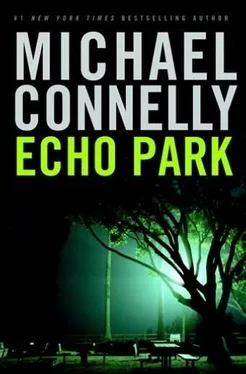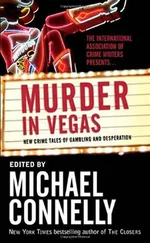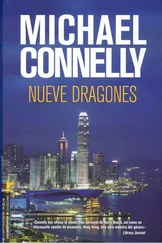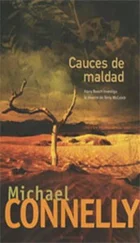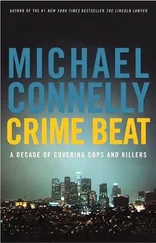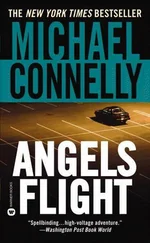“Yeah, the last guy,” Edgar said without hesitation. “The one puttin’ on the shades.”
Bosch looked over. Pratt had just put on his Ray-Bans. Bosch felt a deep pressure in his chest, like the worst case of heartburn he’d ever had. He kept his eyes on Pratt and watched him turn away from their position once he crossed the street. He was heading toward the far stairwell.
“Now what? You going to follow him?”
Bosch remembered Pratt saying he had something to do after work.
“I want to but I can’t. I’ve got to shoot you back to DWP.”
“Don’t worry about it, man. I can walk it. Probably be faster with this traffic, anyway.”
Edgar cracked his door and turned to get out. He looked back at Bosch.
“I don’t know what’s going on but good luck, Harry. I hope you get who you’re looking for.”
“Thanks, Jason. Hope to see you again.”
After Edgar was clear Bosch backed out and left the garage. He took San Pedro over to Temple because he assumed that Pratt would take that route on his way to the freeway. Whether he was going home or not, the freeway was the likely choice.
Bosch crossed Temple and pulled to the curb in a red zone. It gave him a good angle on the exit to the police garage.
In two minutes a silver SUV came out of the garage and headed toward Temple. It was a Jeep Commander with a retro boxy design. Bosch identified Pratt behind the wheel. He immediately fit the dimensions and color of the Commander to those of the mystery SUV he had seen take off from the street near his house the night before.
Bosch leaned down across the seat as the Commander approached Temple. He heard it make the turn and after a few seconds he got back up behind the wheel. Pratt was on Temple up at the light at Los Angeles Street and he was turning right. Bosch waited until he completed the turn and then took off to follow.
Pratt entered the crowded northbound lanes of the 101 Freeway and joined the crawl of rush-hour traffic. Bosch came down the ramp and pushed into the line of cars about six vehicles behind the Jeep. He got lucky in that Pratt’s vehicle had a white ball with a face on it atop the radio antenna. It was a giveaway promotion from a fast-food chain. It allowed Bosch to track the Jeep without having to get too close. He was in an unmarked Crown Vic which might as well have had a neon sign on its roof that flashed POLICE!
Slowly but surely Pratt made his way north with Bosch following at a distance. When the freeway cut past Echo Park he looked up to the ridgeline and saw that the crime scene and media soirée on Figueroa Lane was still in full swing. He counted two media choppers still circling overhead. He wondered if his car would be towed from the scene or if he would be able to go back and retrieve it later.
As he drove, Bosch tried to piece together what he had on Pratt. There was little doubt that Pratt had been following him while he was on home duty. His SUV matched the SUV that had been on his street the night before, and Pratt had been IDed by Jason Edgar as the cop who had followed him into the DWP Building. It was not feasible to think that he had been following Bosch simply to see if he was abiding by the rules of home duty. There had to be another reason and Bosch could think of only one thing.
The case.
Once he’d made this assumption, other things quickly came together and they served to only stoke the fire that was burning in Bosch’s chest. Pratt had told the story about Maury Swann earlier in the week, and that made it clear they knew each other. While he had relayed a negative story about the defense attorney, that could have been a cover or an attempt to distance himself from someone he was actually close to and possibly working with.
Also obvious to Bosch was the fact that Pratt was intimately aware that Bosch had regarded Anthony Garland as a person of interest in the Gesto case. Bosch had routinely informed Pratt of his activities in reopening the case. Pratt was also notified when Garland’s lawyers successfully reacquired a court order restraining Bosch from talking to Garland without one of his lawyers present.
Last, and perhaps most important, Pratt had access to the Gesto murder book. It sat most of the time on Bosch’s desk. It could have been Pratt who put in the phony connection to Robert Saxon, aka Raynard Waits. He could have planted the connection long before the book was given to Olivas. He could have planted it so Olivas would discover it.
Bosch realized that the whole plan for Raynard Waits to confess to the murder of Marie Gesto and to lead investigators to the body could have completely originated with Abel Pratt. He was in a perfect position as a go-between who could monitor Bosch as well as all the other parties involved.
And he realized that with Swann part of the plan, Pratt wouldn’t need Olivas or O’Shea. The more people in a conspiracy, the more likely it is that it will fail or fall apart. All Swann had to do was tell Waits that the prosecutor and investigator were behind it and he would have planted a false trail for someone like Bosch to follow.
Bosch felt the hot flash of guilt start to burn at the back of his neck. He realized that he could be wrong about everything he had been thinking until a half hour before. Totally wrong. Olivas might not be dirty after all. Maybe he had been used as skillfully as Bosch had been used himself, and maybe O’Shea was guilty of nothing more than political maneuvering-taking credit where it was not due him, redirecting blame away from where it was due. O’Shea could have called for the department fix simply to contain Bosch’s accusations because they would be politically damaging, not because they were true.
Bosch thought this new theory through again and it held up. He found no air in the brake lines, no sand in the gas tank. It was a car that could drive. The only thing missing was motive. Why would a guy who banked twenty-five years with the department and was looking at retiring at fifty risk it all on a scheme like this? How could a guy who had spent twenty-five years chasing bad guys let a killer go free?
Bosch knew from working a thousand murders that motive was often the most elusive component of crime. Obviously, money could motivate, and the disintegration of a marriage could play a part. But those were unfortunate common denominators in many people’s lives. They could not readily explain why Abel Pratt had broken across the line.
Bosch banged the palm of his hand hard on the steering wheel. The question of motive aside, he was embarrassed and angry with himself. Pratt had played him perfectly and the betrayal was deep and painful. Pratt was his boss. They had eaten together, worked cases together, told jokes and talked about their kids together. Pratt was heading toward a retirement that no one in the department believed was anything other than well-earned and well-deserved. It was time to double-dip, collect a department pension and grab a lucrative security job in the islands where the pay was high and the hours low. Everybody was shooting for that and no one would begrudge it. It was blue heaven, the policeman’s dream.
But now Bosch saw through all of that.
“It’s all bullshit,” he said out loud in the car.
THIRTY MINUTES INTO THE DRIVE Pratt exited the freeway in the Cahuenga Pass. He took Barham Boulevard northeast into Burbank. The traffic was still thick and Bosch had no trouble following and maintaining his distance and cover. Pratt drove past the back entrance to Universal and the front entrance to Warner Bros. He then made a few quick turns and pulled to the curb in front of a row of town houses on Catalina near Verdugo. Bosch drove on by quickly, took his first right and then another and then another. He killed his lights before taking one more right and coming up on the town houses again. He pulled to the curb a half block behind Pratt’s SUV and slid down in his seat.
Читать дальше
